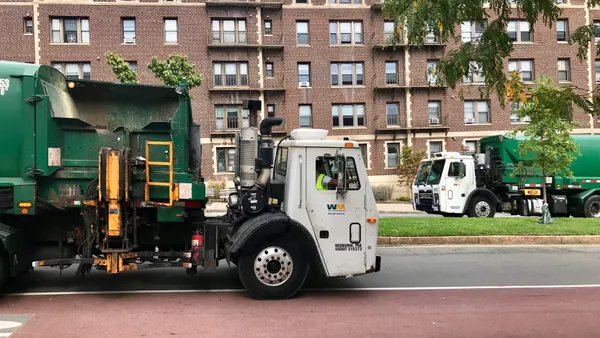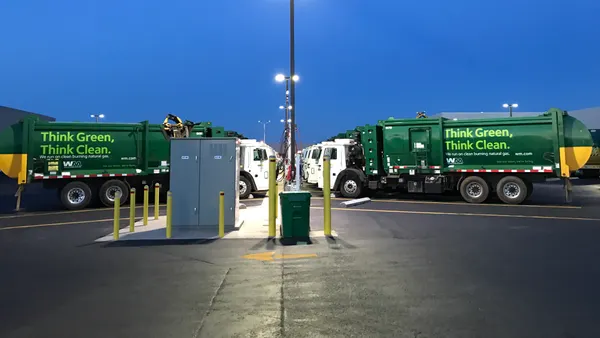Welcome to Scrap Collector, Waste Dive's Friday round-up of insights and stories you may have missed during the week.
REPORT FRAMES MARINE PLASTIC POLLUTION AS FEDERAL ISSUE
Last month, faculty and students from UCLA School of Law abandoned perpetually sunny SoCal for the frostier temperatures of Washington, D.C. The impetus behind this somewhat questionable decision? Briefing Congress on marine plastic pollution — and possible action the federal government can take to combat the crisis.
Since Congress passed a 2015 bill to ban microbeads, there's been little movement at the federal level to regulate plastics — but a report prepared by the Frank G. Wells Environmental Law Clinic and the Surfrider Foundation ahead of the briefing aims to shake up that stasis. One proposed step? Implementation of a nationwide fee on single-use bags (both plastic and paper) at their point-of-sale. According to the report, such policies have had a proven effect on consumer behavior in the U.S. and abroad — jurisdictions with mandatory fees have reported a 70-85% decrease in single-use plastic bag consumption.
Other recommended action items include straw-by-request legislation, a ban on all EPS foam products and establishment of a uniform EPR program for single-use plastics.
"In the United States, it's been mostly local governments [looking to address plastic pollution]," noted Julia Stein, the clinic's supervising attorney, in an interview with Waste Dive. "One of the benefits of comprehensive federal legislation is preserving local governments' efforts — and maybe augmenting them and protecting them from the state-level preemption that's happening in certain areas."
Stein hopes that the present wave of plastic waste scrutiny will help shift domestic focus away from recycling. "It's not a bad thing to have a conversation about recycling, of course, and it's not a bad thing when companies are taking voluntary steps to reduce the amount of plastic in their waste stream," she says. "But it's not going to get us all the way there in terms of solving the problem."
In addition, Stein maintains, discussions around plastic pollution should expand beyond their present scope.
"There's been a big focus on the impact on oceans and the ocean's ecosystems, which is really important — but part of what gets lost in the conversation is the climate change connection," she says. "It's not just that there are terrible impacts to marine wildlife and ecosystems. And it's not just that there are potential human health impacts from having this stuff infiltrate the food that we eat and the water that we drink. There's a serious connection to global warming here — and when we're talking about the plastic industry ramping up production over the next several decades, that also means ramping up emissions."
IN OTHER NEWS...
Mussels losing muscles in the face of plastic pollution — Anglia Ruskin University
Or, more accurately, byssal threads. According to new research conducted at the Portaferry Marine Laboratory in Northern Ireland, blue mussels exposed to doses of non-biodegradable microplastics over 52 days produced significantly fewer byssal threads (the fibers that enable them to cling to surfaces), losing approximately 50% of their attachment strength.
The study, which was published in the journal Environmental Pollution, is among the first to examine the effects of microplastics on marine life — and, says lead researcher Dr. Dannielle Green, its findings could have dire implications: "Byssal threads help mussels to form aggregations, increasing fertilisation success and making mussels more resistant to predation. A reduction in byssal threads in the wild could lead to cascading impacts on biodiversity as well as reducing yields from aquaculture, as mussels are more likely to be washed away by waves or strong tides."
Seriously, stop throwing your needles into the recycling bin — The Press Democrat
While it may be difficult to find a needle in a haystack, it's apparently extremely easy to spot one in a sorting line at Recology's Santa Rosa, California MRF. On bad days, says operations manager Joseph Essig, workers see hundreds of needles in a single shift — and during one really bad period last year, his team filled 50-gallon containers with needles every six to seven weeks.
Aside from being incredibly dangerous for sorters — a 2018 study conducted by SWANA and the Environmental Research & Education Foundation found that needles could account for 45% of MRF injuries — this massive influx of needles is also costly and time-consuming. The sorting line shuts down every time a needle is found, costing the company $600 per hour.
The problem hasn't gone unnoticed: last September, California became the first state in the nation to create a comprehensive, producer-funded take-back system for hypodermic needles and other medical "sharps." The law goes into effect in 2021 — but until then, Recology says that it's taking a more active role in managing the problem, providing MRF workers with reaching equipment (e.g., litter pickers and kitchen tongs), $80 gloves and safety training.
AROUND THE WORLD
British MPs urge UK to stop exporting plastic waste to developing countries — Resource
"No developing nation should be the dumping site for the developed world," declared Malaysian environment minister Yeo Bee Yin last year — and it appears that the UK may be taking heed.
A group of 35 MPs have signed an Early Day Motion calling for a blanket ban on UK plastic waste exports to developing countries, noting that "two thirds of plastic waste separated for recycling in the UK is currently sent abroad for processing." An estimated 105,000 tons of UK plastic were exported to Malaysia alone from 2017 to 2018.
Sian Sutherland, co-founder of nonprofit A Plastic Planet, commended the signatories for taking action against the "despicable practice of exporting plastic waste abroad."
"Go to any developing country and you will see the irrefutable evidence of the West's addition to plastic," she said. "For decades we've buried our heads about recycling being the answer. Now we know that we have been sending our waste to some of the world's poorest people. It is immoral and exploitative, and it is happening in our name."
Meanwhile, a two-year investigation has identified the UK as Europe's worst exporter of illegal hazardous e-waste to developing nations — no news yet on whether British politicians might consider a similar ban on exporting out all that toxic, soupy goodness.
SEEN & HEARD
Holding up her phone: "You want a design challenge? Design this so no one dies when you're making it, and no one dies when you're disposing of it." @safiyanoble kicking off #DHU4 ????
— nikki stevens (@drnikki) February 2, 2019
Years ago , I did a curb side pick up. We hand sorted paper,plastic &glass. Frying pans,running shoes, taxidermy animals,a pellet gun that looked real , dead animals, beer keg , lots of porn , Needles. I do FE garbage now & that’s even crazier.i have some nice overfilled can pics
— Kevinthegarbageman (@kevgarbageman) February 2, 2019
Imagine being under a wave of #plasticpollution... would it inspire you to #beatplasticpollution?
— Ocean Heroes Bootcamp (@OceanHeroesHQ) February 5, 2019
“Over flow”, work by Tadashi Kawamata at The MAAT, Lisbon Portugal, allows you to do just that... ????️????????
????️ @garybencheghib featuring Melati Wijsen, co-founder of @BBPB_bali pic.twitter.com/3VtoNtkHd0












